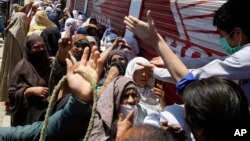The United Nations is boosting its appeal for billions of dollars in coronavirus aid, saying the money is necessary to “protect millions of lives” and help stop the spread of the virus in “fragile countries.”
The U.N.’s humanitarian office said Thursday the world’s poorest countries are not expected to experience the peak of COVID-19 until sometime in the next three to six months, but that already those areas are seeing lost jobs and income, as well as tighter food supplies and children going without vaccinations.
An earlier appeal asked for $2 billion in funding, and the agency said Thursday it needs a total of $6.7 billion.
“If we do not support the poorest people – especially women and girls and other vulnerable groups – as they battle the pandemic and impacts of the global recession, we will all be dealing with the spillover effects for many years to come. That would prove even more painful, and much more expensive, for everyone,” said U.N. humanitarian chief Mark Lowcock.
The increased appeal includes adding nine countries to the list of those most vulnerable: Benin, Djibouti, Liberia, Mozambique, Pakistan, the Philippines, Sierra Leone, Togo and Zimbabwe.
A number of countries are starting to lift strict lockdown restrictions put in place to stop the spread of the virus during the past few months, as officials express optimism that the worst has passed in their nations.
But health experts are warning of the potential for a resurgence of infections if the restrictions are lifted too quickly.
“We’re risking a backslide that will be intolerable,” said Dr. Ian Lipkin of Columbia University in New York.
Governments in Europe and individual U.S. states are among those currently starting to allow certain businesses to reopen, and people to start going to restaurants and shops as long as they follow social distancing guidelines. Health officials have expressed concern the public will see those moves as a sign that the threat of the virus is gone.
“If we relax these measures without having the proper public health safeguards in place, we can expect many more cases and, unfortunately, more deaths,” said Josh Michaud, associate director of global health policy with the Kaiser Family Foundation in Washington, D.C.
South Korea is taking new steps as its number of new infections remains around zero. Its largest airline said Thursday it would resume flights to the United States, Europe and other parts of Asia next month.
The South Korean government is also expanding shipments of masks to other countries, with a focus on those with an urgent need amid larger outbreaks of COVID-19.
In Brazil, the health ministry reported a record rise of 10,500 new confirmed cases, pushing the country’s total above 125,000.
There are about 3.8 million confirmed cases worldwide, with 264,000 deaths.




